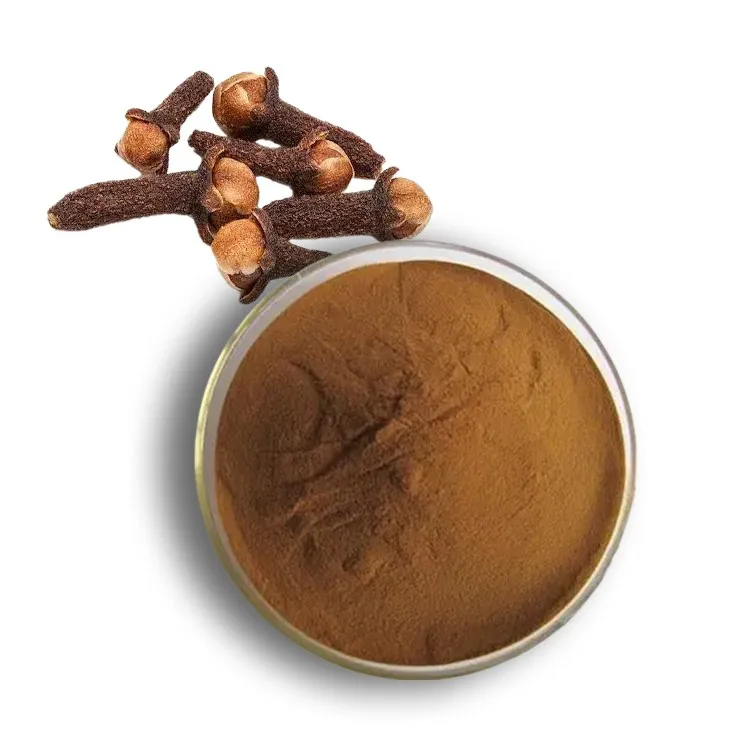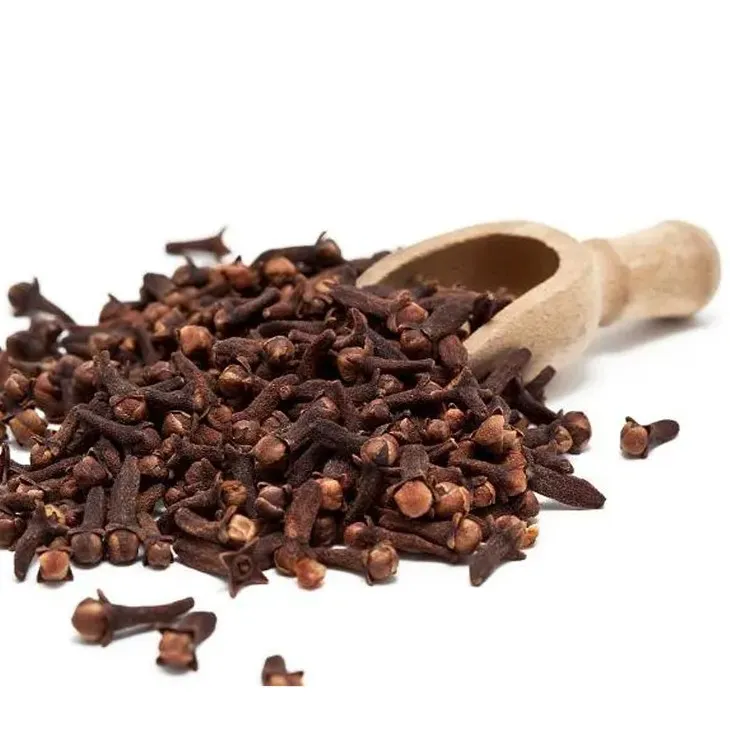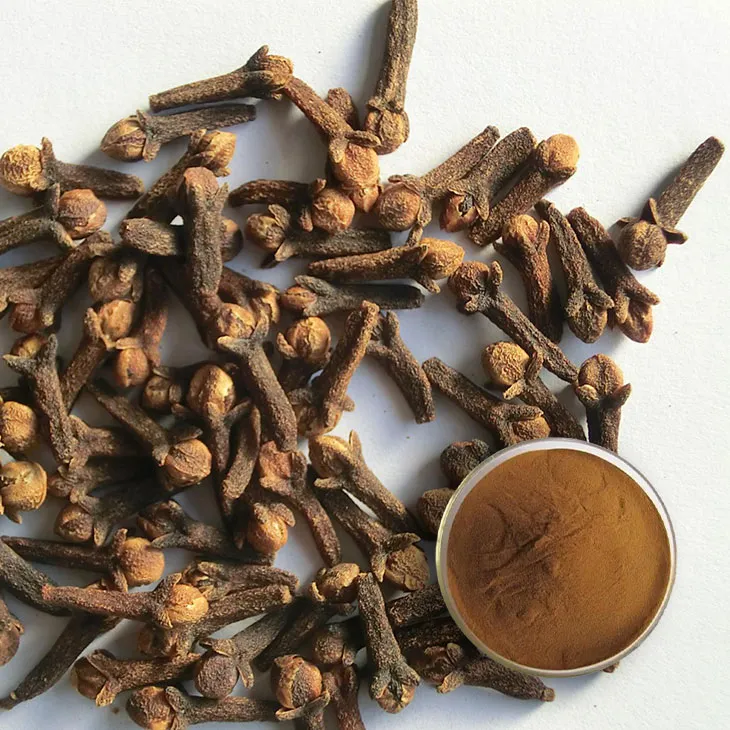- 0086-571-85302990
- sales@greenskybio.com
The Magic of Clove Powder: A Comprehensive Guide
2024-11-13

1. Introduction to Clove Powder
Clove Powder is a spice that has been used for centuries in various cultures around the world. It is derived from the dried flower buds of the clove tree, Syzygium aromaticum. These small, dark brown buds are rich in essential oils, which give Clove Powder its characteristic strong, warm, and spicy aroma.
Clove powder is a staple in many kitchens, especially in Asian, African, and Middle Eastern cuisines. It adds a unique depth of flavor to both sweet and savory dishes. However, its uses extend far beyond the culinary realm. Clove powder has also been recognized for its potential therapeutic properties in traditional medicine systems.

2. Culinary Uses of Clove Powder
2.1 In Baking
Clove powder is a common ingredient in baking. It pairs well with other warm spices such as cinnamon, nutmeg, and allspice. In classic recipes like gingerbread, cinnamon rolls, and fruitcakes, clove powder imparts a distinct flavor that is both spicy and sweet. Just a small amount of clove powder can transform an ordinary baked good into a rich and aromatic treat.
For example, when making a traditional apple pie, adding a pinch of clove powder to the cinnamon - spiced apple filling enhances the overall flavor profile. The cloves add a subtle heat that complements the sweetness of the apples and the buttery crust.
2.2 In Savory Dishes
In savory cooking, clove powder is used in a variety of ways. It is often an ingredient in spice blends for meat rubs, marinades, and curries. In Indian cuisine, cloves are a key component of garam masala, a popular spice mix. When used in a meat curry, clove powder helps to tenderize the meat and infuse it with a complex flavor.
Cloves also work well in slow - cooked stews and braises. For instance, in a beef stew, adding a couple of teaspoons of clove powder along with other seasonings like bay leaves, thyme, and black pepper can create a deeply flavored and satisfying dish. The cloves cut through the richness of the beef and add a warm, spicy note.
2.3 Beverages
Clove powder can be used to flavor hot beverages as well. In mulled wine, a traditional winter drink, cloves are one of the essential spices. The combination of clove powder, cinnamon, and orange peel in red wine, heated gently with a bit of sugar, creates a fragrant and warming drink perfect for cold evenings.
It can also be added to tea. Chai tea, which originated in India, often contains clove powder. The spicy flavor of the cloves adds an extra dimension to the tea, along with other spices like cardamom and ginger.

3. The Aroma of Clove Powder
The aroma of clove powder is one of its most distinctive features. It has a warm, pungent, and slightly sweet smell that is instantly recognizable. The essential oils in clove powder, particularly eugenol, are responsible for this powerful aroma.
When used in cooking, the aroma of clove powder fills the kitchen, creating an inviting and homely atmosphere. In potpourri or scented sachets, clove powder can be used to add a spicy and warm fragrance to a room. It can also be added to homemade candles or diffusers to create a cozy and relaxing environment.

4. Therapeutic Potential of Clove Powder
4.1 Antimicrobial Properties
Clove powder has been shown to possess antimicrobial properties. Eugenol, the main component of clove essential oil, has been found to be effective against a wide range of bacteria, fungi, and viruses. This makes clove powder potentially useful in treating infections, both internally and externally.
For example, in traditional medicine, clove powder has been used to relieve toothache. The antimicrobial action of the cloves can help to combat the bacteria that may be causing the pain. It can be applied directly to the affected area or used in a mouthwash.
4.2 Anti - Inflammatory Effects
Studies have suggested that clove powder may have anti - inflammatory effects. The compounds in clove powder may help to reduce inflammation in the body, which is associated with various chronic diseases such as arthritis and heart disease.
Consuming clove - spiced foods or using clove powder in herbal remedies may potentially contribute to overall health by reducing inflammation levels. However, more research is needed to fully understand the mechanisms and effectiveness.
4.3 Digestive Aid
Clove powder has long been used as a digestive aid. It can stimulate the production of digestive enzymes, which helps in the breakdown of food. In traditional medicine, it has been used to relieve symptoms such as indigestion, bloating, and nausea.
A cup of tea made with a small amount of clove powder may be soothing to the digestive system. Additionally, adding clove powder to certain foods can enhance their digestibility.
5. How to Store Clove Powder
Proper storage is important to maintain the quality of clove powder. Clove powder should be stored in an airtight container in a cool, dry place, away from direct sunlight. Exposure to heat, light, and air can cause the essential oils in the powder to degrade, leading to a loss of flavor and aroma.
It is best to store clove powder in a dark - colored glass jar or a metal tin. If stored correctly, clove powder can retain its potency for up to a year.
6. Precautions and Considerations
While clove powder has many potential benefits, it is important to use it with caution. Clove powder is highly concentrated, and excessive use can cause irritation, especially in sensitive individuals.
When using clove powder for therapeutic purposes, it is advisable to consult a healthcare professional, especially if you are pregnant, breastfeeding, or have underlying health conditions. Additionally, some people may be allergic to cloves, so it is important to be aware of any adverse reactions.
7. Conclusion
Clove powder is truly a remarkable substance with a wide range of uses. Its unique flavor and aroma make it a valuable addition to the kitchen, while its potential therapeutic properties offer additional benefits. Whether you are using it to enhance the flavor of your favorite dish, create a pleasant - smelling environment, or explore its health - promoting effects, clove powder has much to offer.
FAQ:
What is clove powder?
Clove powder is made from dried cloves. Cloves are the flower buds of the Syzygium aromaticum tree. They are harvested, dried, and then ground into a fine powder. This powder has a strong, warm, and spicy aroma.
How is clove powder used in cooking?
Clove powder is a versatile ingredient in the kitchen. It can be used in baking, for example, in gingerbread cookies or fruitcakes to add a warm and spicy flavor. It's also used in savory dishes like stews, curries, and marinades for meats. A small amount of clove powder can enhance the overall flavor profile of a dish.
What are the potential therapeutic effects of clove powder?
Clove powder may have several potential therapeutic effects. It has been traditionally used for its antimicrobial properties, which might help in fighting against certain bacteria and fungi. It may also have anti - inflammatory properties and can potentially relieve toothache when applied topically (although this should be done with caution and under proper medical guidance).
How should clove powder be stored?
Clove powder should be stored in an airtight container in a cool, dry place. Exposure to air, moisture, and heat can cause it to lose its flavor and potency more quickly. Storing it properly can help maintain its quality for a longer period.
Can everyone use clove powder?
While clove powder is generally safe for most people when used in moderation in cooking, some people may be allergic to it. Also, excessive use, especially in its concentrated form for medicinal purposes, may cause side effects such as skin irritation or digestive problems. Pregnant women should be cautious as high doses may pose risks. It's always best to consult a healthcare provider if there are any concerns.
Related literature
- The Health Benefits of Clove: A Review" by [Author Name]
- "Clove in Culinary and Medicinal Applications" by [Author Name]
- "The Chemistry and Pharmacology of Clove" by [Author Name]
- ▶ Hesperidin
- ▶ citrus bioflavonoids
- ▶ plant extract
- ▶ lycopene
- ▶ Diosmin
- ▶ Grape seed extract
- ▶ Sea buckthorn Juice Powder
- ▶ Beetroot powder
- ▶ Hops Extract
- ▶ Artichoke Extract
- ▶ Reishi mushroom extract
- ▶ Astaxanthin
- ▶ Green Tea Extract
- ▶ Curcumin Extract
- ▶ Horse Chestnut Extract
- ▶ Other Problems
- ▶ Boswellia Serrata Extract
- ▶ Resveratrol Extract
- ▶ Marigold Extract
- ▶ Grape Leaf Extract
- ▶ blog3
- ▶ blog4
- ▶ blog5
-
Organic Tongkat Ali extract powder factory.
2024-11-13
-
How to make powder with ashwagandha extract.
2024-11-13
-
Rosehip extract manufacturers from China.
2024-11-13
-
The best cat's claw extract in nature.
2024-11-13
-
Chinese Dandelion Leaf Extract Suppliers.
2024-11-13
-
Baicalin
2024-11-13
-
Elderberry Extract
2024-11-13
-
Centella Asiatica Extract
2024-11-13
-
Alfalfa Meal
2024-11-13
-
Phyllanthus Emblica Extract
2024-11-13
-
Withania Somnifera Extract
2024-11-13
-
Longan Extract
2024-11-13
-
Dandelion Leaf Extract
2024-11-13
-
Alisma Extract
2024-11-13
-
Genistein
2024-11-13





















